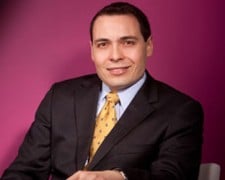 Brian Wieser, Senior Research Analyst at Pivotal Research Group, is seeing a positive trend emerging for the radio biz. In recent periods, radio has gained many new champions whose backgrounds and experiences originated outside the industry. It will need them to be successful if the business is to return to growth in the future, he notes in his “Madison & Wall” post:
Brian Wieser, Senior Research Analyst at Pivotal Research Group, is seeing a positive trend emerging for the radio biz. In recent periods, radio has gained many new champions whose backgrounds and experiences originated outside the industry. It will need them to be successful if the business is to return to growth in the future, he notes in his “Madison & Wall” post:
“The radio industry and Japan’s economy have had much in common in recent decades. After a promising and prolonged period of growth, a significant decline followed, with subsequent periods best characterized by an absence of further decline followed with few reasons to believe that pockets of growth would gestate broader recovery. As islands-unto-themselves, both seemed to us parochial, failing to sufficiently embrace change in part, perhaps, because of a limited degree of diversity in terms of individual backgrounds and experiences. While we’re not expert enough on Japan to assess the prospects for a successful long-term turnaround due to Abenomics, we think we it’s worth opining on what we notice as a different kind of change which may be coming to the radio industry.
For many years local radio has generated around $14bn in advertising revenue annually (down from closer to $19bn annually a decade ago), and national radio advertising has totaled in the low billion dollar range over the same period. In assessing the underlying cause of these conditions, we can point to changes in the industrial nature of the American economy as probably hurting radio more than anything (whereby we think there are probably now relatively fewer mid-sized / regional marketers who may have been among radio’s more important advertisers in the past). But the business has done itself few favors and failed to manage away negative sentiment by advertisers towards the medium despite providing what many of them consider to be high value marketing platform. For example, terrestrial radio never seemed to let the likes of SiriusXM and Pandora into the “club”. It subsequently has had a hard time shaking a perception as a Luddite business in a digital age, despite various digital initiatives many of the incumbents have undertaken (such as Clear Channel’s I Heart Radio or CBS’ efforts with Last.fm).
But we have noticed an important change that may be taking root. In recent periods, several highly regarded executives whose backgrounds lie in ad technology, online advertising, television and the agency business have taken on senior roles (as in, reporting to the CEO) with radio station groups including Clear Channel and Cumulus. On our read, we see the radio industry’s interest in talent from outside its own business as reflecting a recognition that new people and new ideas may be needed to drive growth. These moves also, undoubtedly, reflect a high degree of confidence in the future of the radio industry by these executives, too.
Concurrently, Nielsen has substantially expanded its exposure to radio by purchasing Arbitron, the industry’s primary provider of ratings services. As Nielsen’s CEO, David Calhoun said on his company’s earnings call this week, “the big opportunity…is to demonstrate that radio is more effective than the world thinks it is…it can be a bit of a forgotten medium relative to everything digital and everything TV…We believe that radio is a more vibrant medium than the way the world perceives it….Our job is now to develop metrics that will shed light on that, and then ultimately, let it play out in all the mixed modeling and resource allocation decisions that advertisers make.”
With increasing numbers of champions of radio bearing perspectives which extend beyond one medium, the prospect for traditional radio advertising – and no less, ad sales at Pandora and SiriusXM to the extent that a rising tide may lift all boats – should be viewed more favorably. Our own forecasts continue to point to flat trends going forward, at least as of this point in time. But as we have seen in many fields including economics that the potential of individuals to catalyze needed change across a broad business eco-system should not be under-estimated if those individuals can successfully co-ordinate an effort to solve the problems that have otherwise hindered growth. Towards this end, the prospects for future growth of the radio business may come down to the capabilities of its newest participants.”
RBR-TVBR observation: If radio can increase its content reach by adding digital and mobile platforms, coupled with unique and compelling content for listeners and advertisers, it will indeed survive any storm—as it always has. Wieser is right in pointing out that adding the right minds from outside our medium will help that process along. Radio should also never forget that its calling card is hyper-local. A simple suggestion in that vein is to bring in contest winners who play their own music for a set and co-host with the DJ. It’s done sometimes, but not enough. High school students should be brought in regularly via a limo ride for content and shout-outs on CHR stations, etc…This makes advertisers happy, too.





